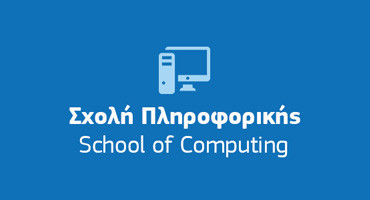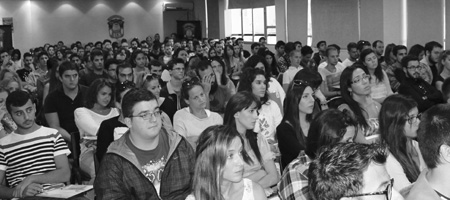





BSc (Hons) Cyber Security
-
The 1st Bachelor’s degree in Greece in Networks & Computer Security.
-
Certified by the Chartered Institute of Information Security (CIISec).
-
Includes CCNA certification.
-
Cisco Certified Network Labs & Microsoft Azure Labs integrated.
*Subject to approval

Course Information
The School of Computer Science at Mediterranean College, with 30+ years of experience, offers fully updated study programmes designed in collaboration with leading IT and Telecommunications companies. The BSc (Hons) Cyber Security is provided by the University of Derby, a TOP 20 British University according to the Guardian University Guide 2020.
Organizations are required to ensure that the information they possess and transmit through networks is secure and confidential. However, numerous security breaches and network intrusion incidents have shown that this is a continuous battle for businesses, creating a need for graduates specialized in networks, programming, and their security.
As an industry-standard programme, the new Cyber Security programme combines modern knowledge and skills from Computer Science and Data Networks into a unified programme with a focus on Infrastructure and Data Security, enriched with Programming and Networks.
What Will You Learn
The programme prepares you to become an expert in computer networks, security, and specialized programming techniques in cybersecurity. You will gain the technical skills to design and implement physical network infrastructure, as well as software development skills to ensure that the solutions you implement are robust and secure.
You will study advanced topics such as network switching and routing, wide area networks, Cisco and Microsoft networks, and internet programming with Java, data management with Python, and Artificial Intelligence (AI) for cybersecurity. You will acquire the tools to understand security issues, critically analyze and evaluate solutions to such problems. Additionally, you will engage with the theory and implementation of wired and wireless networks, network management, security, development of network applications, and security protocols at both hardware and software levels.
As part of the programme, you have the opportunity to attend the Cisco CCNA programme at Mediterranean College’s official Cisco Certified Academy.
Why choose this course
- The degree is awarded by the University of Derby, a top-ranked British university (TOP20, Guardian University Guide 2020).
- Fully updated content, certified by the Chartered Institute of Information Security (CIISec).
- It is an industry-standard programme, with diverse software development environments and cutting-edge languages specialized in cybersecurity (Java, JavaScript, Python, SQL).
- The knowledge of Network Security prepares you for the Ethical Hacking certification.
- You are taught in state-of-the-art High-Performance Computing Labs, Cisco-certified Network Labs, and Microsoft Azure Labs.
- You engage in real-world operational projects for application development and cybersecurity system design, based on virtual or real businesses.
- You develop into a bilingual IT professional with excellent academic and professional prospects.
- Through the programme, you have the opportunity to acquire the coveted CCNA certification from Cisco.
- You have the option to change your specialization in the 2nd year of study: Computer Science or Games Programming.
The programme is delivered through lectures, some of which are given by guest professors, as well as laboratories, tutorials, and rich e-learning materials. Emphasis is placed on developing practical programming skills using cutting-edge software development tools in our industry-standard laboratories, as well as configuring network devices. Assessment is primarily based on individual assignments, with group projects, presentations, and online tests also included. The Cyber Security programme includes numerous projects where students design, implement, and test cybersecurity systems. In the final year’s dissertation project, you will develop your own implementation of a cybersecurity system based on programming languages as well as network and infrastructure design.
Module Description
Year 1
Foundation of Computer & IT Systems
Introduction to the basic concepts, terminology, fields, and history of computer science, while providing students with the opportunity to develop their academic skills in studying, writing, researching, and presenting scientific topics. The course covers topics such as the history of computing, computational theory, number systems, introduction to algorithms and data structures, microprocessors, machine language and assembly, computer architecture, operating systems, compilers and interpreters, software, hardware, and networks.
Computational Mathematics
Introduction to mathematical concepts and methods primarily applied in computer science, including set theory, Boolean algebra, logic, differential and integral calculus, linear algebra, graph theory, numerical analysis, and iterative methods.
Programming
Introduction to the fundamental principles, concepts, and practices of computer programming, and the development of necessary skills for designing, implementing, and testing simple programmes. No prior programming experience is required, and all practical work is done using the industry-standard C# language and Microsoft's Visual Studio software development environment.
Fundamentals of Network & Security
The course covers the fundamental concepts of network operation, including the OSI and TCP/IP models, IPv4 and IPv6 addressing, TCP, UDP, HTTP, and DHCP protocols, routing, switching, and basic LAN network design. Additionally, the course analyzes Ethernet functions in a LAN environment and specifications for designing and building a network for a small business.
Computer Systems, Data Structures & Data Management
This course explores two related but distinct fundamental concepts of computational applications in practice: human-computer interaction and data. The course includes product design, user interface design, usability, data representation, data modeling, and data storage. Data structures and their manipulation are implemented using the Java/Python programming languages.
Scripting & Web Technologies
This course provides an introduction to modern web/scripting software development environments as a means of developing cross-platform applications, including internet-based applications. These platforms provide code-based approaches and methodologies for software development, allowing for rapid application development, including remote management and cybersecurity.
English I
Students develop general English language skills, such as reading, writing, listening, and speaking, and are introduced to academic English. They also enhance their abilities in grammar, pronunciation, and general and specific vocabulary related to computer science terminology. By the end of the course, their level of academic English will be at the midpoint of B2 according to CEFR, equivalent to IELTS 5.5.
Year 2
Ethical Hacking
The course covers the principles and methods for managing and securing a LAN network from internal and external threats. The course content includes security identifiers, encryption, monitoring and interpretation of logs and alerts, implementation of firewalls, user permissions, security policies, ethical issues in policy enforcement, backup protection and fault tolerance techniques, and techniques for dealing with attacks from hackers.
Legal & Ethical Issues in Computing & Data Sciences
The course provides an introduction to the legal and ethical aspects of computer science. It covers the operation of professional bodies, including the role of codes of ethics and best practices (BCS). It then addresses the legal frameworks for data protection, privacy and security, intellectual property, and cybercrime. Students learn about the most recent applicable laws related to the use of computers and information technologies. This legislation pertains to data protection, privacy and security, intellectual property, and cybercrime.
Software Engineering
The course focuses on software development from a software engineering perspective and provides the theory and practical skills for producing software that meets user expectations in terms of quality, functionality, and development within predefined time and budget constraints. The course thoroughly examines the Software Development Life Cycle (SDLC), presenting methodologies for analysis, design, standardization, implementation, testing, installation, and maintenance of programmes.
Data Driven Systems
The course covers the development of Network Communication Systems and Protocols and how they are controlled through programming applications. Communication systems are rapidly expanding in terms of scale and capabilities, and this module examines Client-server and Peer-to-Peer systems, including Bandwidth requirements and availability. At this point, students create network protocol control applications using Java/Python. The course equips students with the necessary knowledge of programming solutions to network protocol and communication problems.
Communication & Security Protocols
This course examines data protection mechanisms suitable for various systems and architectures within the Internet, with a particular focus on cryptographic mechanisms, communication management and security measures, and network security devices. These mechanisms provide data confidentiality, integrity, as well as access control and identity verification mechanisms.
Team Project
The course aims to cultivate employability skills by introducing students to the "world of work" within a virtual business environment. Students are placed in groups representing fictional IT companies, with the goal of producing real hardware/software products and involving themselves in real operational activities. The experiences gained by students in the Team Project significantly relate to Software Engineering methodologies, such as project management, code standardization and review, design patterns, standardization, and documentation.
English II
This course builds upon the English I course and further develops students' general and academic skills in reading, writing, listening, and speaking. Students are exposed to more advanced forms of academic English and enhance their abilities in grammar, pronunciation, and general as well as specialized vocabulary related to computer science. In the end, students are expected to demonstrate a higher level of proficiency in English for academic and professional purposes.
Year 3
Artificial Intelligence for Security:
This course describes the main methods and applications of AI in cybersecurity. The techniques covered include classical machine learning, linear regression, linear classifier, K-means clustering, decision trees, support vector machines, artificial neural networks, and modern deep learning techniques covering convolutional neural networks, long short-term memory networks, neural networks, and genetic networks.
Security Architectures & Future Trends:
The goal of this course is for students to understand and implement common security controls available for preventing, detecting, and recovering from security breaches and to mitigate security risks in future trend technologies. Topics covered include understanding new information technology and cybersecurity technologies, their security challenges, and approaches to addressing them, as well as understanding various security architectures.
Individual Project:
The individual project allows students to demonstrate their ability to develop a substantial piece of work related to their specialization. It can be a significant research piece following recognized research methodology or the implementation, testing, and evaluation of a significant "design and development" project in the field of computer science. Students are supported and guided by a member of the academic staff, i.e., a supervising professor, but the project is defined and implemented by the student.
Data Mining & Foundations of AI:
This module introduces students to data mining techniques and processes and the foundations of Artificial Intelligence (AI). The module prepares students for the practical use of data mining tools and the application of basic AI algorithms using the Python programming language. Students will also learn:
- Data mining processes, including data organization and cleansing, applying data mining techniques to identify patterns in data, and interpreting results from data mining tools.
- Differences in data mining techniques and determining the most suitable approach for a given real-world application.
- Fundamental concepts, uses, and techniques in AI.
- Selecting the appropriate AI method for an application.
- Using data mining tools and applying AI methods in practice.
Security Management:
This module examines strategic approaches that can be taken to manage security systems. It focuses on areas critical to maintaining security on both a daily operational basis and in crisis situations. It covers information security management and risk management related to information technology, networks, information systems, data, and critical business systems.
It covers important security management principles and functions involved in protecting an organization's critical information, network resources, and assets. It provides information on what information/network security experts would do concerning systems and policies to ensure the secure operation of networked business units and guidelines for recovery in case of a disaster.
Admission Requirements
The programme is suitable for you if you are a high school graduate from any discipline with satisfactory English language skills and aspire to pursue a career in the IT industry.
The required English language level for the bilingual programme is equivalent to IELTS 4.5 (B1), and for the English-language programme, it is IELTS 6.0 (B2). If you don’t have a language proficiency certificate, you will participate in the College’s English diagnostic test.
Additionally, you will be asked to submit a recommendation letter from a teacher and be invited to an academic interview with the programme coordinator.
If you hold a diploma from an IEK, or you are a university or college student in a related field, you may be eligible for advanced placement in the programme through a course recognition process.
Application & Enrolment
We accept applications throughout the year, until all available positions in each department are filled. As this is a strictly laboratory-based programme with limited spots, we encourage you to submit your application in a timely manner.
Furthermore, we offer multiple alternative tuition payment options, financing programmes, and scholarships based on academic, athletic, and socio-economic criteria.
Contact us today and inquire about the study programme and the opportunities for tuition subsidies and financing. The Education Advisors at the Admissions Office will provide you with the necessary information about the programme and the application and enrollment process.
Degree Recognition
You can have your degree recognized in Greece by submitting a professional equivalence application to ATEEN (Hellenic NARIC) of the Ministry of Education.
Click here to find out more about the recognition of studies.
Postgraduate Study
As a graduate in the field of Computer Science, you can pursue postgraduate studies in technical specializations or in the fields of Management, both in Greece and abroad. At Mediterranean College, you can choose to attend the following programmes:
Alternatively, you can specialize in Networking by pursuing the professional certifications CCNA and CCNA at the Approved Cisco Academy of Mediterranean College.
Career Prospects
With successful completion of the programme, you will be able to engage in the design, implementation, maintenance, and protection of network infrastructures and integrated information systems. Whether in a startup or a large organization, you will be able to build a career in the following areas:
- Design and development of corporate data networks
- Installation and maintenance of network infrastructure
- Network management
- Database management
- Cybersecurity management/analysis
- Network security
- Cloud technologies, security in the cloud
- Development of secure network applications
- Wired/wireless communications
- Consulting services in cybersecurity
- Operational cybersecurity issues
Testimonials
The 3 years I studied at Mediterranean College, I had the opportunity to further my knowledge and develop a range of personal and professional skills. I also learned how to work as a team to accomplish our goals. All the academic and administrative staff were really supportive and helpful....
Georgios Choutsisvilli, BSc (Hons) Computer Science.
Studying at the University of Derby was an interesting experience, the level of studies is really good but most of all we met people that we became good friends with. I wish all the best for their life and career....
Dimitrios Pozaritis, BSc (Hons) Computer Science
My time at the College was great. I made some great friends there who helped me overcome many problems. I learned a lot from my time there and I want to thank my teachers for supporting me throughout these three years....
Christos Avgerinos, BSc (Hons) Computer Science




